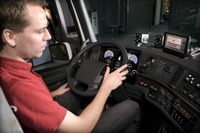Modern technology can reduce the driver’s stress level
 Traffic is becoming increasingly intensive and hectic. At the same time, we are seeing increasing numbers of electronic support systems in our vehicles, all of them competing for the driver’s attention. This applies not least to drivers of commercial vehicles. In order to improve traffic safety, we need better knowledge of how the driver handles safety systems and information systems while driving. Volvo has co-ordinated a pan-European research project (AIDE) that focuses on these aspects and its conclusion is that many accidents can be avoided if the systems are co-ordinated and better tailored to suit the flow of traffic and the driver’s situation.
Traffic is becoming increasingly intensive and hectic. At the same time, we are seeing increasing numbers of electronic support systems in our vehicles, all of them competing for the driver’s attention. This applies not least to drivers of commercial vehicles. In order to improve traffic safety, we need better knowledge of how the driver handles safety systems and information systems while driving. Volvo has co-ordinated a pan-European research project (AIDE) that focuses on these aspects and its conclusion is that many accidents can be avoided if the systems are co-ordinated and better tailored to suit the flow of traffic and the driver’s situation.On April 15th-16th the project submitted its final report when nearly 200 researchers from throughout Europe, motoring industry experts and EU representatives were on hand when the results of four years’ research were presented.
“We know that the human factor is a contributory cause in at least 90 per cent of all traffic accidents. If we can provide technology that adapts support systems to suit the individual driver and the current traffic situation, many accidents would be able to be avoided,” says Lars-Göran Löwenadler, Safety Director at Volvo Trucks.
“It is positive that the number of safety and information systems in modern vehicles is increasing. Taken individually, they offer many benefits as regards traffic safety and productivity. However, bearing in mind that many drivers have mobile phones and perhaps also a GPS satellite navigator in the vehicle, today’s driver does risk being over-burdened by too much information. In order to improve traffic safety, we have developed solutions that allow all the systems to interact smoothly,” explains Volvo Technology’s AIDE co-ordinator, Gustav Markkula.
In concrete terms, AIDE is all about creating a user interface between the vehicle’s technology and the driver. The challenge is to integrate all the support systems into the driver’s environment so that they help the driver in the best possible way at exactly the right time and do not risk disrupting him in situations where the traffic demands all his attention.
Smart, integrated communication solutions, user-friendly instrument panels, co-ordination of safety functions and better understanding of how driver behaviour is affected by acoustic and visual signals are some of the results of the research. One of the outcomes of the research is Volvo Trucks’ prototype Integrated Safety Truck, a positive example of the potential available with integrated safety solutions.
“The results indicated the direction of tomorrow’s product development. Some of the ideas we can already see in our forthcoming truck models,” reveals Lars-Göran Löwenadler.
About thirty or so companies co-operated in the project, which was partly financed by EU funds. Many of the participants emphasised the significance of joint projects between researchers, industry and the EU member countries. One of them was Zita Gurmai, an MEP responsible for the EU’s focus on increased traffic safety through the ‘Intelligent Car Initiative’. She says, “Every year, more than 40,000 people are killed in Europe as a result of traffic accidents. That is why AIDE research is important. Not just because it tailors technology’s potential to the human being, but also because it creates a common view within the EU. This is a precondition for achieving broad-based concrete results. Our goal is clear: to save lives.”

